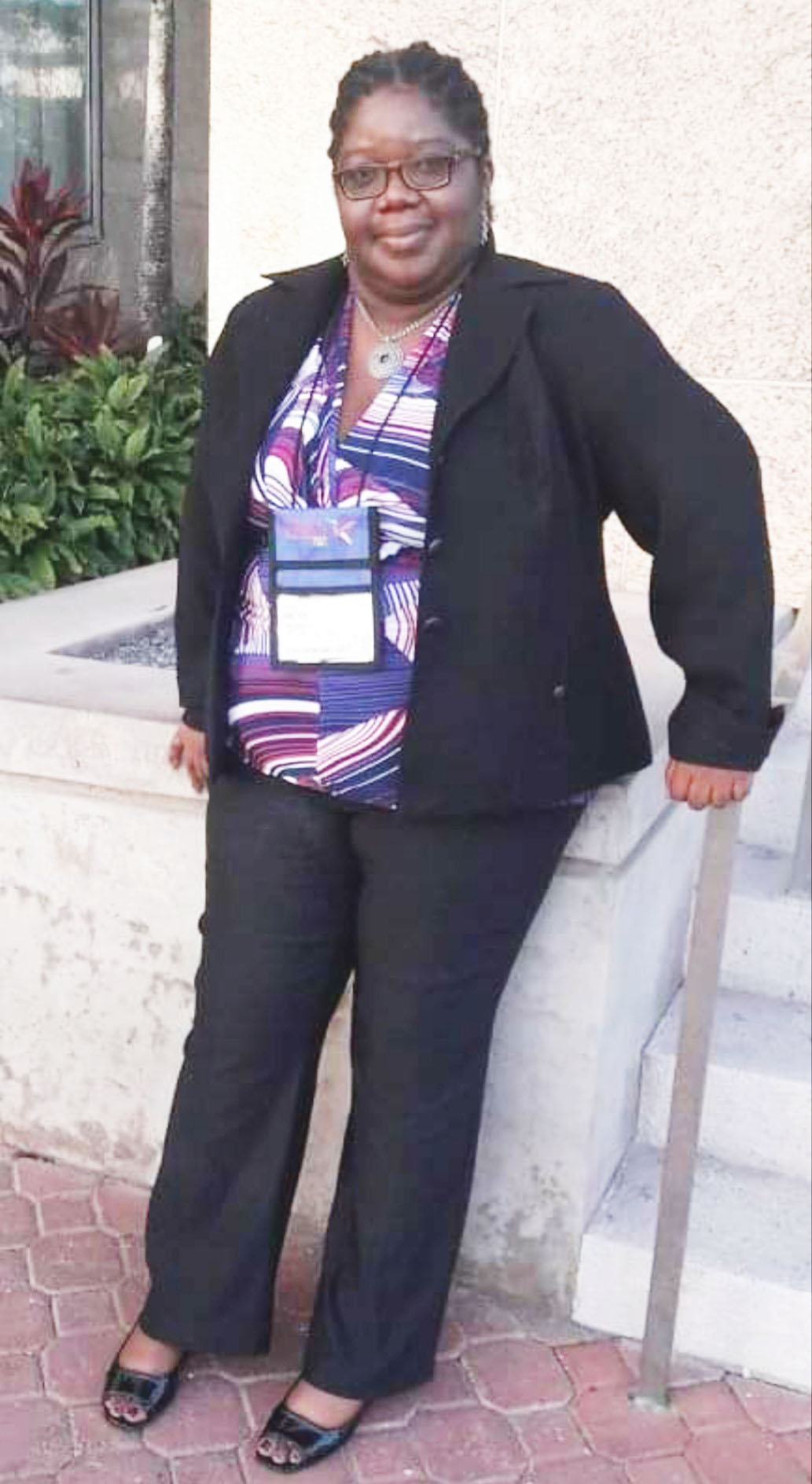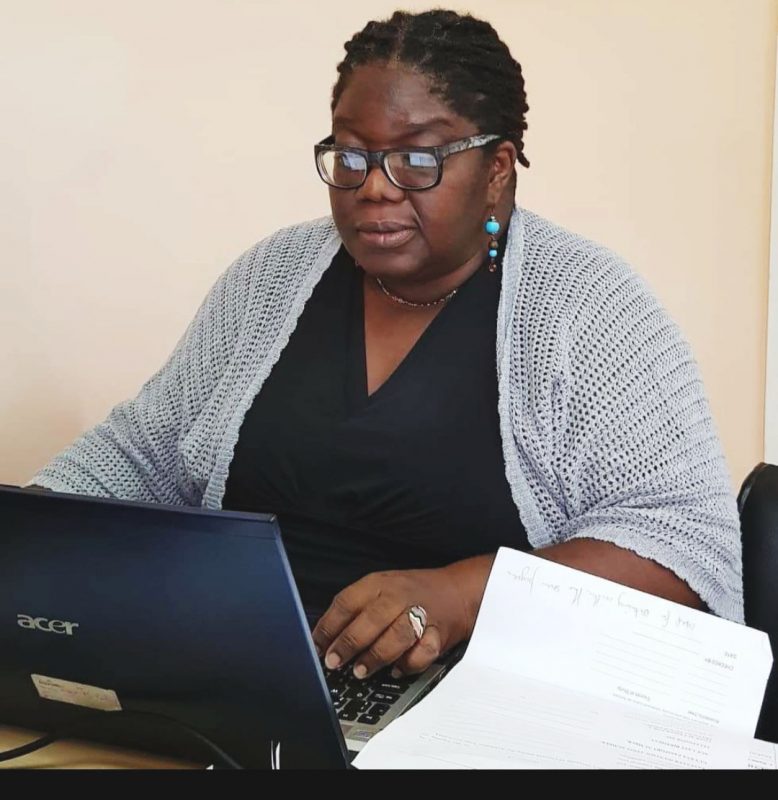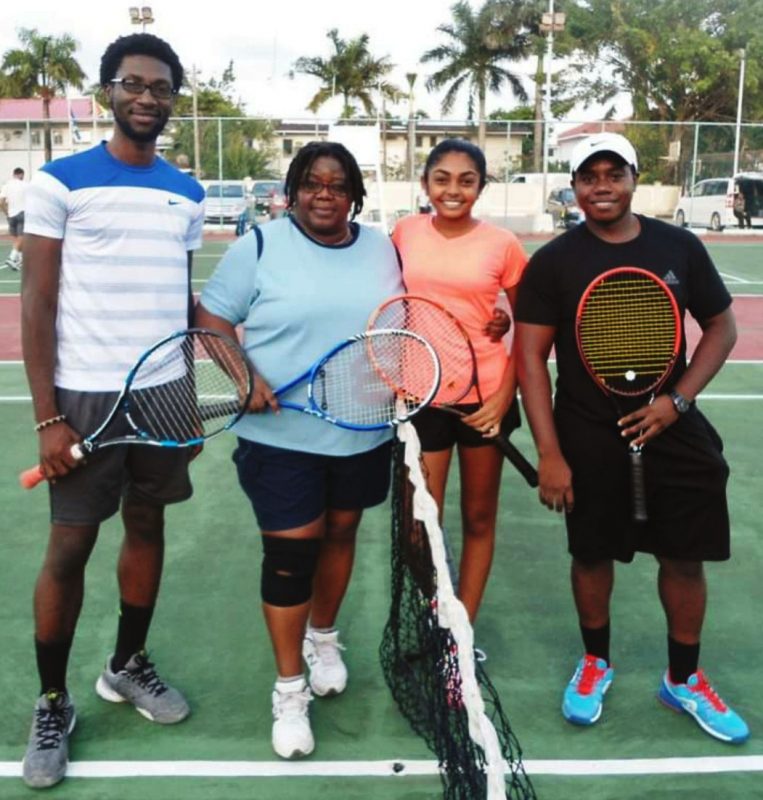Nurtured by her godmother from a few months old and now a godmother to many, information technology (IT) business analyst Grace McCalman, 54, is among the pioneers of IT systems in both the local private and public service sectors.
McCalman, who works with local company Innovative Systems Incorporated and freelances, said, “You make IT work for you, to solve your problems. It is not the other way around. Many people in management positions are still to understand this.”
She has a bachelor’s degree in Mathematics and Computer Science from Trent University, Canada and is a past student of the Bishops’ High School and Queen’s College. After leaving QC, she worked as a customer service representative at the Guyana Bank for Trade and Industry (GBTI) where her interest in computing grew. From GBTI she went to Trent University on a Public Service Ministry (PSM) scholarship funded by the Canadian International Development Agency.
Tribute to Nenny
McCalman told Stabroek Weekend in an interview that when she was just a few weeks old, she was left in the care of her family while her mother migrated to the USA on a nursing scholarship. A woman she calls her godmother, some of whose “humanitarian traits” she has inherited, she said, informally adopted her.
“I don’t know the details of my mother’s migration. All I knew was that my godmother always ensured I was safe, protected and well looked after. She always intended to hand me over to my mother in one piece,” McCalman said. “I heard my mother sent for my father and he married someone else. My mother never came back. As a child, I remember she called a few times.”
The McCalmans are from East and West Berbice, she said, adding, “I bump into them here and there and I try to piece together my origins. I heard about three or four decades later that my relatives deliberately stayed away from me because they were upset that my mother agreed to have a stranger take care of me. I’ve heard I have many uncles and aunts but I’ve only met my mother’s twin sister and her son and another aunt who passed away.”
McCalman grew up in Georgetown with her godmother, Ada Rose and Rose’s mother who died when McCalman was 12 years old. When she became an adult and looked at TV shows featuring people wanting to know who their birth parents were, she reflected that she never missed her parents and was thankful for the love and security she got from her godmother.
“I guess I was optimistic my mother would make contact when the time was right. It never happened,” she noted. “I tried to contact her several times when I was at university in Canada and one time I went to her home in the US and couldn’t find her. Later I called and talked to her once. It was just like normal. No dramatics. I then lost contact with her. In recent years, I started trying to find her again.”
Her godmother was known as Nenny because she was a guardian of students on the government’s hinterland scholarship programme. “I spent my childhood, at any time, with eight to nine children from the interior. Nenny never ever treated me differently from them,” she recalled. “If there was anything to share we all got the same size of everything. My whole life was about her. When she died, I lost a part of me with her.”
GuySuCo and PSM
Returning to Guyana from university, all the IT graduates were placed in the Guyana Sugar Corporation (GuySuCo) IT department as systems analysts. “It was a great environment in which we explored all aspects of computer science that we learnt at university,” she said. The IT department at GuySuCo was fairly new and the corporation was run by the British firm, Booker Tate. “We came back from university with our ideas which the management welcomed. The primary focus was to improve on production in the factories. The first two to three of those five years was pioneering. We set up the systems to manage inventory and to ensure the factories were always running. We had one of the biggest servers in town,” she said. “I recall coming home late at night and not fully sleeping because I woke up every other hour to see if the backup was running on a laptop I had at the head of my bed, when I was the database administrator. You don’t play with data. The network can go down, the server can go down, but you don’t want the data to go down. You have to make sure you always have backups in one, two, or three places and that they are always accessible as part of a disaster recovery plan.”
When GuySuCo installed its internal PBX, McCalman was operations manager and she oversaw networking of the estate. “My job there was enjoyable and fulfilling. I loved going to the various estates to see how they were improving their work through technology,” she said.
She worked at GuySuCo from 1995 to 2000 and then went to the PSM where she stayed until 2008.
Moving to the PSM was stepping back in time for her. “Everything was manual. This is the ministry that controls the human resources at all the other ministries. I was encouraged to see how I could apply my skills there,” she said. “I had opportunities to leave the country and to work with an international financial institution. I thought my country needed me more so I went to the PSM to help to set up the network and build a system to manage all the employees in the public service.”
The PSM, she said, had good support from the Inter-American Development Bank and the Presidential Secretariat.
“It took a little while but we were able to set up systems to accurately maintain information on all the employees in the public service,” she noted. “At the time about 20,000 positions were in the establishment and only about 11,000 to 12,000 were filled. I had to also report on discrepancies and vacancies and things like that. I was excited to produce information because I always liked working with data.”
She never had a title because she was not a PSM employee. “I was always on contract. That is another story trying to standardise the IT titles in the public service according to what was on the international scale,” she noted.
There were challenges she said because the PSM is complementary to the Ministry of Finance and the management of the public service lies with the PSM and the Public Service Commission while salaries are paid by the Ministry of Finance. “For nothing could we get the two ministries to come together and agree on integrated processes,” she recalled. “If you are computerising, the system has to model what we do in real life and build up on that. At our level of IT in both ministries, we dialogued, did demonstrations and powerpoint presentations to bring the ministers and management at higher levels to convince them that both ministries had bought systems that would make things easier for both ministries if they share one database on employees. So while the PSM managed the people side of things, all the Finance Ministry had to do was press the button and the public servants would be paid. That concept never got through.”
Not sharing information meant the PSM had to build its own system. “So you end up with duplicate data. To this day, over 20 years later, it remains the same,” she said.
In 2008, McCalman took a transfer to the Guyana Revenue Authority (GRA), which bought a new system to integrate taxes and customs duties and needed someone to review what was in place. “Working at the GRA was very satisfactory,” she said. “GRA had all the elements of a typical full scale corporate organisation.”
Sporting life, humanitarian
McCalman always liked challenging her colleagues to a sprint or fight even though she knew she could not win. “At primary school I fought a lot. When I went to Bishops’ my whole personality changed but I continued with a competitive attitude all the way to QC where I played a lot of badminton,” she recalled.
At GBTI, she moved from badminton to lawn tennis as the bank had hired a coach for staff interested in playing the game. “My love for tennis started there under coach Charlie Adams,” she shared. “I played at university and when I came home in 1998 I joined the Guyana Lawn Tennis Association (GLTA).”
After the GLTA became inactive and remained that way for about four years, she got together with a few people including Rudy Grant and Fitz McLean and they formed an interim management committee to reestablish the GLTA. They sorted out the financial issues and established affiliation with the International Tennis Federation. “So we moved from strength to strength from 2004 to now,” she said.
For most of her life since then McCalman has been consumed with tennis, looking for children with talent and ensuring the coaches execute their programme so children can play at a level where they can be chosen for a scholarship to a university.
“It has been a real struggle keeping tennis going because we were working in isolation, without funding, without recognition and with minimal support from the Guyana Olympic Association, the Ministry of Culture, Youth and Sports (MCYS) and so on,” she said. “Fortunately, we have always had good persons who want to see the sport grow regardless of constraints. Based on recent discourses with officials of the MCYS, we believe we will get more support for our programmes.”
McCalman manages the GLTA’s multimedia operations, social websites and everything needed to properly constitute an association. She was secretary of the GLTA for about nine years, spent time as a junior development officer and served a two-year stint as president. She is now a GLTA life member.
To promote the sport, the GLTA is looking to neighbouring organisations in Suriname and French Guiana to host competitions at the goodwill level, the Cup of the Guianas, before going further. Standard international courts are needed, but are not available locally.
McCalman is considered a ‘tennis mom’. She transports players to and from training sessions and sometimes ensures they are fed before taking them to their homes. “Once, my godsister who was visiting from the US saw the children at my home and asked, ‘Why are you feeding everybody? You have the traits of your godmother. I don’t know where you getting the money to feed everyone.’ I pretty much spend my money on whatever comes by. It could be a cat. I don’t say no to anyone in need of help,” McCalman said.
In 2008, she joined the Rotary Club of Stabroek to give of herself in a structured way. She was its secretary for many years and will serve a term as President from July this year.
With the onset of the Covid-19 pandemic, McCalman said, one of the things the club focused on was teaching reading and mathematics to children in grade six and lower. “The Ministry of Education does not have the resources to cater for the needs of all children who are not doing exceedingly well. This is where NGOs can come in… Children suffered the most through Covid. We are looking to collaborate with other NGOs in this area.”
Growing up, she lived among Indians who were Hindus, Muslims, Christians and neighbours who were Portuguese and Amerindian.
“Everything that happened around me was multicultural. My godmother was Black and Indian.
As a child I was so free to love everyone and everything,” she recalled. “When I started working in the public service, I recognized the ills of racism in our society and it still bothers me. Some countries do not have the golden diversity we have as a people. We must maximise the potentials we have in our diversity to be a model for humanity.”







